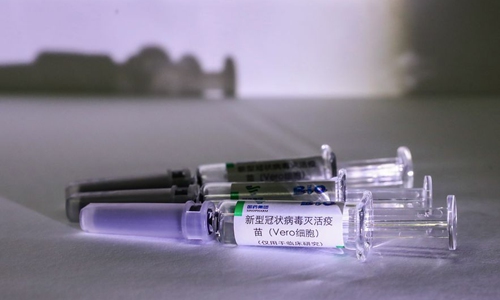Reveal as many risks as possible in vaccine clinical trials: Chinese top researcher

Samples of the COVID-19 inactivated vaccine are seen at a vaccine production plant of China National Pharmaceutical Group (Sinopharm) in Beijing, capital of China, April 10, 2020.Photo:Xinhua
Chinese COVID-19 vaccine researchers should attempt to reveal as many risks as possible in vaccine clinical trials and advise the public against panicking over minor side effects revealed in the preliminary results, Chinese top vaccine researcher Chen Wei suggested on Sunday. The statement was seen as a response to some Western media hyping the side effect ratio reported in early-stage clinical trials of the Ad5-nCoV recombinant novel coronavirus vaccine Chen has been working on.
A research team led by epidemiologist Chen Wei developed an adenovirus vector COVID-19 vaccine, Ad5-nCoV, on March 16, the first Chinese-developed candidate vaccine to enter clinical trials. On May 22, the vaccine became the first in the world to disclose complete phase one clinical trial results and declare dual immune response in the recipient.
However, around 87 percent of the 108 participants reported at least one adverse reaction such as fever, muscle pain, or headache, within the first seven days following vaccination, raising concerns and pessimism around this vaccine.
During a clinical drug therapy conference on Sunday in Beijing, Chen suggested that US-developed mRNA-1273 vaccine candidate prompted a higher incidence of adverse reactions than Ad5-nCoV according to its clinical trials data released on Tuesday, Science and Technology Daily reported Monday.
After the second vaccination of mRNA-1273, six (40 percent) in the 100-μg group, and eight (57 percent) in the 250-μg group reported fever, higher than that of Chinese-developed candidate Ad5-nCoV.
For other reactions such as fatigue, headache, muscle pain, and vomiting, mRNA-1273 all revealed higher incidence than Ad5-nCoV developed in China, Chen noted. Even so, Chen said, the US is confident for their vaccine's safety.
Chen appealed vaccine researchers from various countries to share more data and standards for comparison and judgment.
Richard Horton, editor-in-chief of The Lancet, in May praised the first human trials results of Ad5-nCoV that revealed it is safe, well-tolerated and induces a rapid immune response. "These results represent an important milestone," said Horton in his Twitter post.
"Revealing adverse reactions or symptoms in vaccine clinical trials is not terribly frightening," Chen said.
"Our research team is very clear that we do not aim to glorify our vaccine in clinical trials but we try to reveal as many risks as possible, and to resolve them promptly before large-scale application," Chen said at the conference.
Systemic damage caused by the coronavirus in humans, such as its harm to glucose metabolism, requires researchers to give more focus in its vaccine clinical trials, she said.
Different with clinical trials of COVID-19 vaccines in other countries that mostly recruited volunteers only between 18-55 years old, the Ad5-nCoV included participants over 60 in its second phase trials.
"Severity and mortality of COVID-19 increased with age, so the elderly should be a priority for the vaccine research," Chen said.
She said the results of the phase two trials will be announced soon.
Global Times